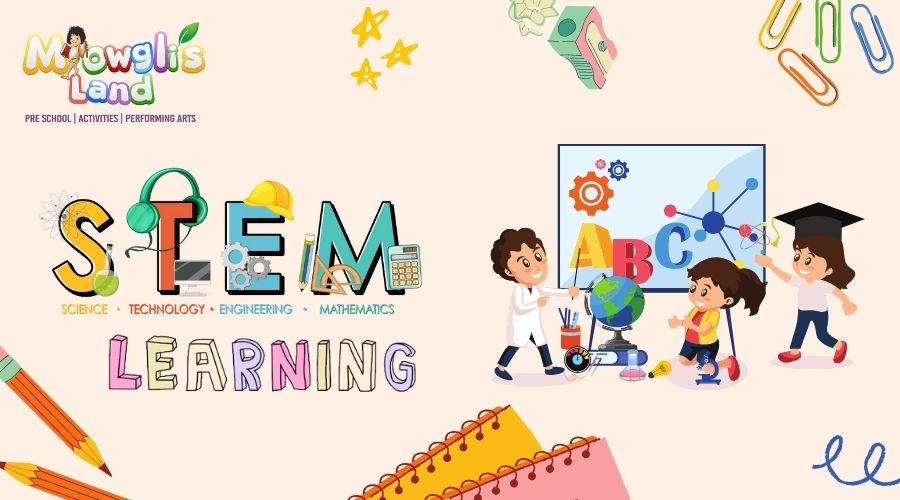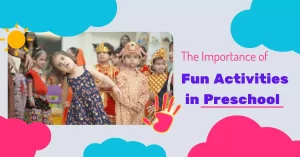In today’s evolving world, introducing the concept of STEM early in a child’s life can foster a lifelong interest and build a strong foundation for future learning. There are various significances of STEM education in the life of a preschooler in their growing years. With Mowgli’s Land Preschool, STEM activities must be incorporated for the child’s overall growth and development in the long run.
The following blog explores the significance of STEM education and provides practical tips for incorporating STEM learning into preschoolers’ daily routines!
What is STEM?
STEM refers to Science, Technology, Engineering, and Mathematics. By integrating these four approaches, preschoolers can be encouraged to develop skills like critical thinking and problem-solving. Children learn to explore, question, and understand the world around them easily. In this learning approach, an individual develops strong thinking skills by connecting classroom learning to the real world.
STEM consists of collaboration, communication, research, brainstorming, and critical skills.
Importance of STEM Education in Early Childhood
For preschoolers, early childhood is a crucial period for their cognitive development. During these years, children are naturally curious and eager to learn. Practicing STEM education at this stage helps nurture your little one’s curiosity and provides a strong foundation in these critical areas of life.
Below are some benefits of STEM education in early childhood:
- Problem-Solving Skills: STEM activities encourage children to think critically and find solutions to problems. Whether it’s figuring out how to build a tower or discovering why certain objects float, these activities stimulate problem-solving abilities in kids.
- Cognitive Development: Engaging with STEM concepts helps improve memory, attention, and overall cognitive abilities. Activities that require sorting, classifying, and sequencing support brain development and cognitive functions.
- Creativity and Innovation: Hands-on STEM activities foster creativity and innovative thinking. By experimenting and creating, children learn to think outside the box and develop new ideas.
- Preparation for Future Learning: Early exposure to STEM prepares children for more complex concepts they will encounter in higher education. A strong foundation in STEM during preschool can make future learning experiences more accessible and enjoyable.
- Communication Skills: STEM activities often require children to communicate their ideas. This helps improve their language and communication skills, which are essential for collaborative learning environments.
Also Read: 6 Best Educational Apps for Kids in a Playschool!
Incorporating STEM Education in Preschoolers
Incorporating STEM education into their growing years can be both fun and educational for your little ones! Some fun practical activities must be followed to develop the necessary skills.
Below are some useful and practical tips for incorporating STEM education in preschoolers:
Science Fun
This involves engaging in some fun science activities like playing with water and sand or looking at bugs under a magnifying glass. This can introduce basic scientific concepts to your kids.
Technology Integration
This involves introducing simple coding games that teach sequencing and logical thinking. This can develop essential motor skills in kids.
Engineering Play
Provide building materials such as blocks, LEGO sets, and recycled materials for children to create structures. This helps them understand basic engineering principles.
Exciting Mathematics
This involves counting objects, sorting shapes and colors, and simple addition & subtraction games. This can build fine cognitive skills in your preschooler.
Important Things to Remember
There are a few things to remember while preparing your toddlers to practice STEM education. Some of them are listed below:
- Age Appropriateness: Ensure that the STEM activities suit the child’s age and developmental stage. You can also choose materials and tasks to keep them engaged.
- Create a STEM-Friendly Environment: Ensure the learning space is equipped with materials that encourage exploration and creativity. Have a variety of resources available, such as magnifying glasses and art supplies.
- Be Patient: Learning new concepts can take time. Be patient and provide support as children explore and learn. Allow your preschooler to make mistakes and learn from them. This fosters a sense of resilience and a growth mindset.
- Build Curiosity: Allow your child to ask questions and encourage them to think critically. Provide them with opportunities for open-ended exploration where there is no right or wrong answer.
Wrap Up!
Except for the above-discussed perks that STEM learning has for preschoolers, it also has a significant impact on their future success. Parents and educators can foster a love for STEM and equip children with the skills they need to survive in this world.
The key is to make learning a joyful and integral part of their lives at Mowgli’s Land. So, set the stage for a lifelong love of discovery and innovation.
Moreover, start early, be patient, and watch your child’s curiosity and creativity flourish!




